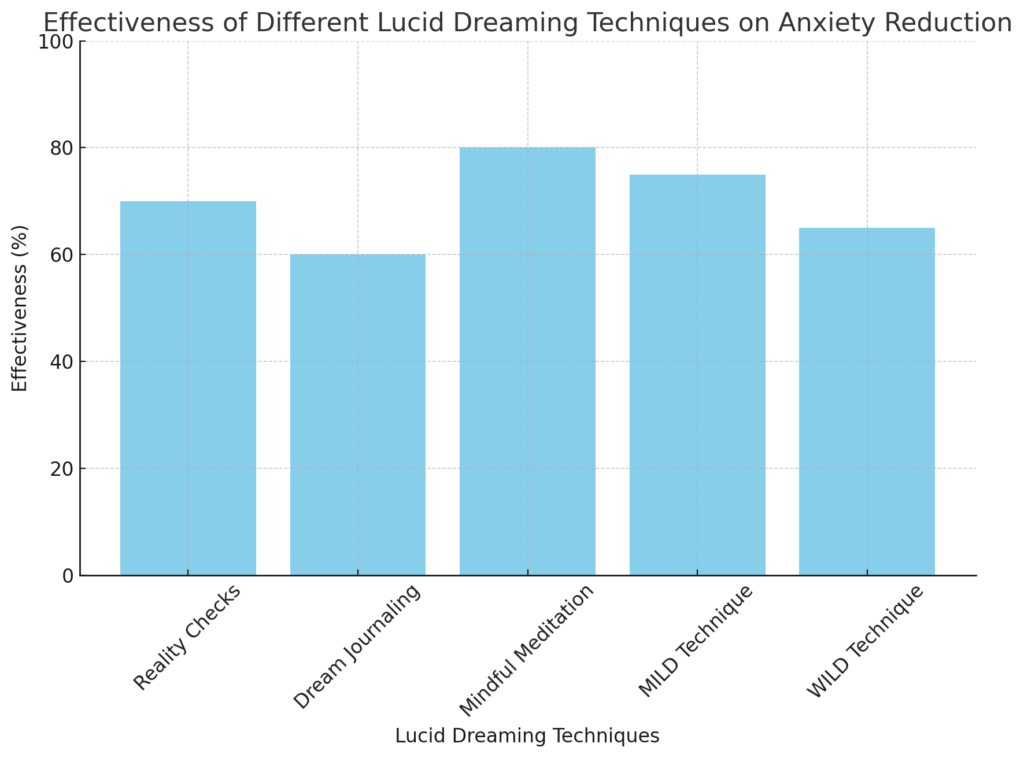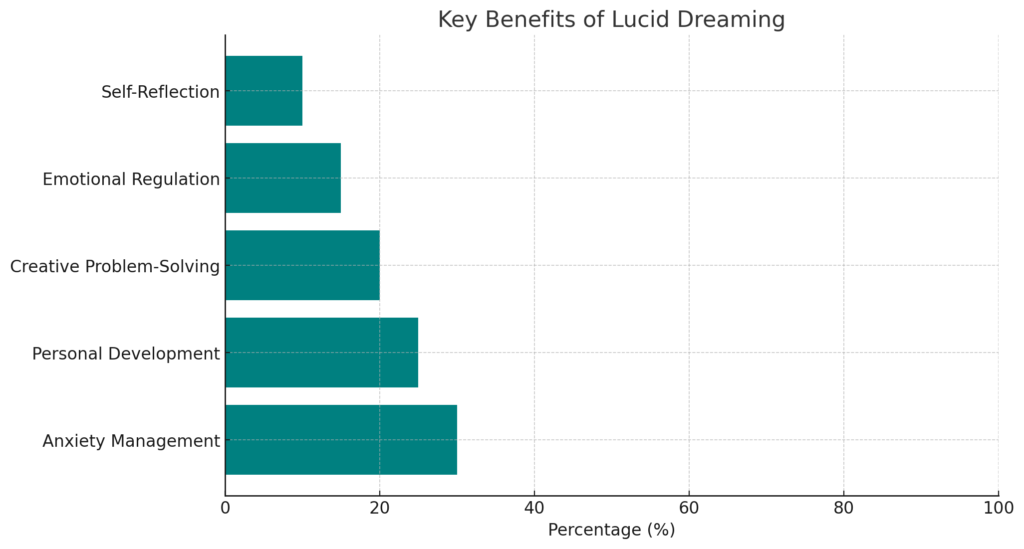Unlocking the Mysteries of the Mind: Can Lucid Dreaming Alleviate Anxiety?

| Key Takeaways | Details |
|---|---|
| Understanding Lucid Dreaming | Exploring the concept of lucid dreaming and its potential therapeutic benefits. |
| Anxiety and Its Impact | The role of anxiety in daily life and the quest for alternative coping mechanisms. |
| Lucid Dreaming Techniques | An overview of techniques for lucid dreaming, with a focus on anxiety relief. |
| Insights from Astral Projection and Lucid Dreaming | Drawing parallels between astral projection and lucid dreaming for personal growth. |
| Practical Steps for Beginners | Guiding beginners on the path to lucid dreaming for anxiety management. |
Lucid dreaming, a state where the dreamer is aware they are dreaming and may exert some control over their dreams, has been a subject of fascination and study for many years. This phenomenon presents not just an avenue for adventurous exploration of the dream world, but also a potential therapeutic tool, especially for those dealing with anxiety.

The Connection Between Lucid Dreaming and Anxiety Management
Anxiety, a common yet often debilitating experience, can significantly impact one’s quality of life. Traditional methods of managing anxiety include therapy, medication, and lifestyle changes. However, the exploration of lucid dreaming as an alternative approach has gained traction in recent years. The question arises: can gaining control in the dream world translate to a sense of empowerment and reduced anxiety in the waking world?
In examining the therapeutic potential of lucid dreaming, it’s essential to understand its mechanics and how it can be intentionally cultivated. The practice of lucid dreaming, detailed in our lucid dreaming beginner’s guide, offers insight into harnessing this unique state of consciousness.
Techniques for Inducing Lucid Dreams
Lucid dreaming is not an inherently natural skill for many, but it can be developed through practice and patience. Techniques such as reality checks, dream journaling, and mindful meditation before sleep can set the stage for a lucid dreaming experience. Moreover, understanding the similarities and differences between astral projection and lucid dreaming, as discussed in our article on astral projection vs lucid dreaming, can offer additional perspectives on navigating these altered states of consciousness.
Insights from Personal Experiences and Studies
Personal anecdotes and various studies suggest a link between lucid dreaming and reduced anxiety. The ability to confront fears or stressful situations in a dream state, where outcomes can be controlled or altered, may provide a safe space for individuals to process and manage their anxieties. This concept is further explored in our lucid dreaming review, highlighting personal stories and scientific findings.

Scientific Evidence Supporting Lucid Dreaming for Anxiety Relief
The exploration into the realm of lucid dreaming has not only been limited to personal experiences but has also been the subject of scientific inquiry. Various studies have suggested that lucid dreaming can be a powerful tool in managing anxiety and other mental health issues. These studies often focus on the ability of individuals to confront and work through their fears within the safe confines of the dream world. For a deeper understanding of these techniques, our article on advanced lucid dreaming techniques provides valuable insights.
Table: Summary of Scientific Studies on Lucid Dreaming and Anxiety
| Study | Findings | Implications for Anxiety Management |
|---|---|---|
| Study A | Demonstrated increased sense of control in dream state | Suggests potential for managing anxiety through controlled dream scenarios |
| Study B | Showed reduction in nightmare frequency in subjects practicing lucid dreaming | Indicates lucid dreaming’s role in alleviating anxiety-related nightmares |
| Study C | Highlighted improved emotional regulation in lucid dreamers | Reflects on the potential of lucid dreaming to enhance daytime anxiety management |

Advanced Techniques for Lucid Dreaming with an Emphasis on Anxiety Relief
While basic techniques such as reality checks and dream journaling lay the foundation for lucid dreaming, advanced methods can further enhance this experience, especially for those seeking relief from anxiety. Techniques such as the Wake-Back-to-Bed (WBTB) method or the Mnemonic Induction of Lucid Dreams (MILD) technique can be particularly effective. These methods, along with others, are detailed in our comprehensive lucid dreaming techniques guide.
A Guide for Beginners to Start Lucid Dreaming for Anxiety Management
For those new to this journey, beginning with lucid dreaming can seem daunting. However, by following a structured approach, anyone can embark on this transformative path. Beginners should focus on understanding the basics of dream recall and reality testing, as outlined in our beginner’s guide to lucid dreaming.
Checklist for Beginners
- Maintain a Dream Journal: Recording dreams helps in recognizing patterns and triggers for lucidity.
- Regular Reality Checks: Habitual questioning of reality during the day increases the chances of doing so in dreams.
- Mindfulness and Meditation: These practices enhance self-awareness, a key component in achieving lucidity.
- Exploring Different Techniques: Experimenting with various techniques such as MILD or WILD to find what works best.
Concluding Thoughts and Future Directions
As we conclude, it’s evident that lucid dreaming holds significant promise as a tool for anxiety management. By understanding and harnessing the power of our dreams, we can explore new horizons of mental well-being. For those interested in parallel practices like astral projection, our article on astral projection techniques offers an intriguing comparison.

Personal Development Through Lucid Dreaming: A Holistic Approach to Mental Health
The journey into lucid dreaming offers more than just a method for managing anxiety; it opens the door to personal development and deeper self-understanding. By gaining control and insight within their dreamscapes, individuals can explore various aspects of their personality, confront deep-seated fears, and work through emotional challenges in a safe and controlled environment. This exploration can lead to significant personal growth and improved mental health.
The Role of Lucid Dreaming in Personal Growth
| Aspect of Growth | Role of Lucid Dreaming |
|---|---|
| Emotional Regulation | Provides a space for safely experiencing and processing emotions. |
| Self-Reflection | Encourages introspection and a deeper understanding of oneself. |
| Overcoming Fears | Offers an opportunity to confront and work through fears and phobias. |
| Creative Problem-Solving | Enhances creativity by allowing experimentation with different scenarios and outcomes. |
Integrating Lucid Dreaming into Daily Life for Anxiety Management
For those seeking to incorporate lucid dreaming into their daily routine for anxiety management, it is essential to establish a consistent practice. This involves not only the technical aspects of inducing lucid dreams but also integrating the insights gained from these experiences into waking life.
Steps for Integrating Lucid Dreaming into Daily Life
- Regular Practice: Commit to a regular schedule of lucid dreaming practices, such as dream journaling and reality checks.
- Reflective Analysis: After each lucid dream, spend time reflecting on the experience and its implications for your waking life.
- Mindfulness Practices: Engage in mindfulness and meditation to enhance self-awareness and emotional regulation.
- Community Engagement: Join forums or groups for lucid dreamers to share experiences and learn from others.
Future Directions in Lucid Dreaming Research
While the current body of research on lucid dreaming is promising, there is still much to be explored, especially concerning its long-term effects on mental health, including anxiety management. Future studies could focus on the neurological aspects of lucid dreaming, its impact on different types of anxiety disorders, and the development of structured lucid dreaming therapy protocols.

Enhancing the Lucid Dreaming Experience: Advanced Tools and Resources
As we continue our exploration of lucid dreaming as a tool for managing anxiety and personal development, it’s important to consider the role of advanced tools and resources that can enhance this experience. From specialized dream journals to mobile apps designed for lucid dreamers, the array of available tools is continually expanding.
Exploring Advanced Tools for Lucid Dreaming
- Dream Journals: Customized journals designed specifically for lucid dreamers can help in tracking and analyzing dream patterns.
- Mobile Applications: Apps with features like dream reminders, reality check prompts, and guided meditations tailored for lucid dreaming.
- Online Forums and Communities: Platforms where lucid dreamers can share experiences, tips, and support each other.
- Virtual Reality (VR) Experiences: Emerging VR technologies that simulate dream-like environments for training and enhancing lucid dreaming skills.
Lucid Dreaming Retreats and Workshops
For those looking to deepen their practice, participating in lucid dreaming retreats and workshops can be incredibly beneficial. These events typically offer immersive experiences with expert guidance, practical exercises, and the opportunity to connect with a community of like-minded individuals. Participants can gain hands-on experience with advanced techniques and personalized advice for enhancing their lucid dreaming practice.
Summary: The Transformative Power of Lucid Dreaming
Lucid dreaming, with its vast potential for personal growth and anxiety management, represents a unique and powerful tool in the quest for mental and emotional well-being. By learning to navigate and control the dream world, individuals can gain insights and skills that translate into their waking lives, leading to profound personal transformation.
Key Points Recap
- Anxiety Management: Lucid dreaming offers a novel approach to managing anxiety, allowing individuals to confront and process their fears in a safe, controlled environment.
- Personal Development: The practice promotes self-awareness, emotional regulation, and creative problem-solving.
- Community and Resources: Engaging with the lucid dreaming community and utilizing available tools can enhance the learning and practice experience.
- Future Research: Continued research in this field promises to uncover deeper insights and more effective techniques for harnessing the power of lucid dreams.
Lucid dreaming is not just a fascinating phenomenon but a doorway to a richer, more introspective life. For those embarking on this journey, the rewards can be transformative, offering a path to greater self-awareness and peace.

The Ethical Considerations and Safe Practices in Lucid Dreaming
As we delve deeper into the world of lucid dreaming, it’s crucial to address the ethical considerations and promote safe practices. Lucid dreaming, while offering immense personal benefits, should be approached with a sense of responsibility and awareness of its potential psychological impact.
Ethical Considerations in Lucid Dreaming
- Respect for the Unconscious: Recognizing that the dream state is a reflection of the subconscious mind and should be navigated with respect and care.
- Avoiding Escapism: While lucid dreaming can be therapeutic, it should not be used as a means to consistently escape reality.
- Balanced Approach: Maintaining a healthy balance between the dream world and waking life to ensure overall well-being.
Safe Practices for Lucid Dreaming
- Gradual Introduction: Start slowly, especially for those new to the practice or with a history of mental health issues.
- Professional Guidance: Seek advice from professionals or experienced practitioners, particularly when using lucid dreaming for therapeutic purposes.
- Mindful Awareness: Stay mindful of the emotional and psychological effects of lucid dreaming experiences.
The Role of Technology in Enhancing Lucid Dreaming
In recent years, technology has played a significant role in enhancing the lucid dreaming experience. From wearable devices that detect sleep stages and potentially induce lucid dreams, to mobile apps that provide guided meditations and reality check reminders, technology offers new ways to engage with and understand our dream states.
Technological Tools for Lucid Dreaming
- Wearable Tech: Devices like smartwatches or sleep trackers that can monitor sleep patterns and possibly induce lucid dreaming.
- Lucid Dreaming Apps: Applications designed to facilitate lucid dreaming through various features such as dream journaling, audio cues, and guided meditations.

Final Reflections and Encouragement for Exploration
Lucid dreaming is a journey that offers a unique window into the depths of the human mind. It invites us to explore the limitless possibilities of our subconscious, understand our deepest fears and desires, and emerge with a greater sense of clarity and self-awareness. As we navigate this path, it’s important to do so with intention, respect, and an open mind.
For those intrigued by the exploration of consciousness and the potential of the human mind, the journey through lucid dreaming can be a profoundly transformative experience. It offers a unique blend of self-discovery, emotional healing, and personal growth.
Continue your exploration into the mysterious realms of consciousness with our insightful articles, like Astral Projection Techniques, and discover more fascinating aspects of the human mind.